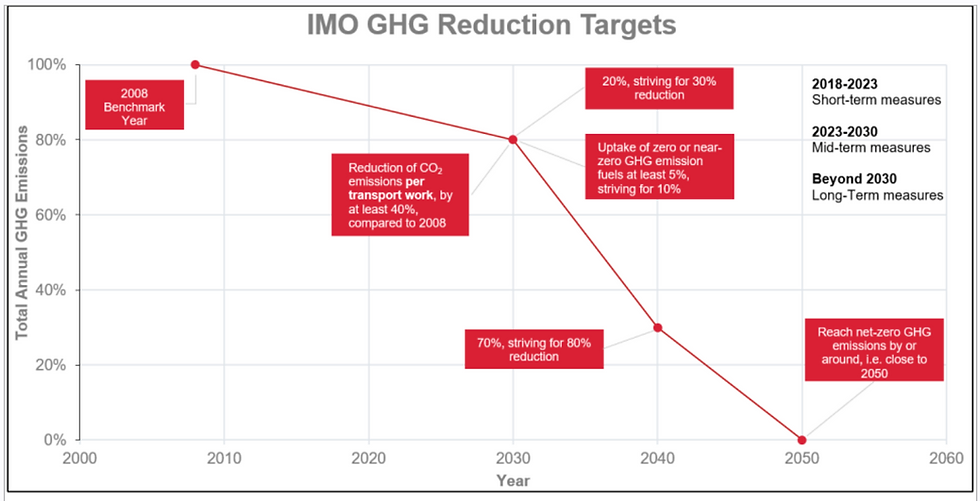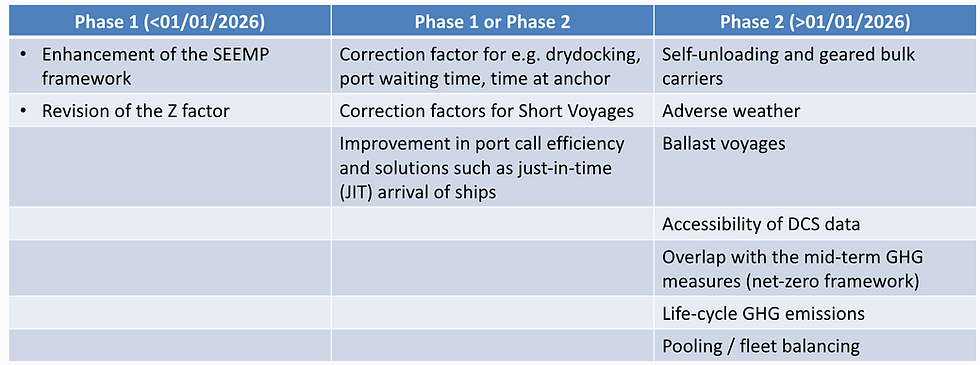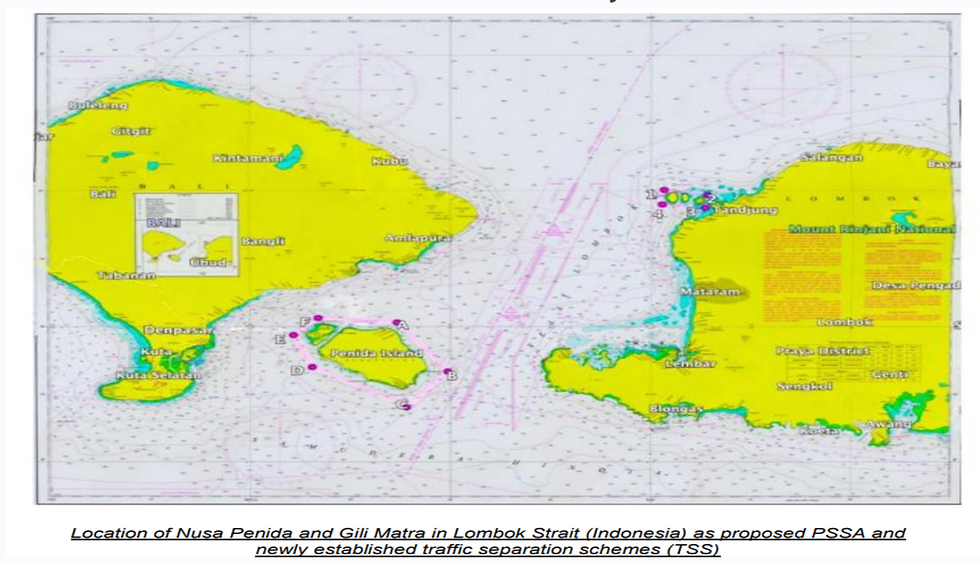MEPC 82 and ISWG-GHG 17: Charting a Path Toward a Greener Future for Shipping
- Mudit Mehrotra

- Oct 17, 2024
- 6 min read

The 82nd session of the Marine Environment Protection Committee (MEPC 82), held from September 30 to October 4, 2024, marked another significant chapter in the International Maritime Organization's (IMO) efforts to combat climate change.
With the shipping industry accounting for around 3% of global greenhouse gas (GHG) emissions, these meetings are of utmost importance as the IMO and its member states work to transform the sector in line with global climate goals.
A Look Back: The 2023 Revised Strategy
In 2023, the IMO took a major step by revising its strategy on reducing GHG emissions from ships. The revised strategy set ambitious targets, aiming to reduce the carbon intensity of international shipping by at least 40% by 2030 and to achieve net-zero GHG emissions as soon as possible, ideally by 2050.
This framework has driven the discussions at MEPC 82 and ISWG-GHG 17, where member states and industry stakeholders debated and proposed measures to meet these challenging targets.

ISWG-GHG 17: Laying the Foundation for Mid-term Measures
The ISWG-GHG 17 meeting, held from September 23 to 27, 2024, was crucial for advancing mid-term measures that could steer the shipping industry toward long-term sustainability. Some of the key areas of focus during the session included:
Development of Mid-term Measures: The ISWG-GHG 17 worked on formulating mid-term measures that would support the reduction of GHG emissions in the medium term. This includes economic measures such as market-based mechanisms (MBMs) that could provide financial incentives for reducing emissions.
Life Cycle GHG Assessment (LCA) Framework: The development of a comprehensive LCA framework is critical for ensuring that emissions are evaluated holistically, taking into account the entire life cycle of fuels used in shipping. This means that emissions produced during the production, transport, and consumption of fuels will all be factored in, ensuring a more accurate assessment of the sector’s environmental impact.
Draft Terms for the Fifth IMO GHG Study: The group also developed draft terms of reference for the upcoming fifth IMO GHG Study, which is expected to provide updated and detailed data on GHG emissions from international shipping. This study will play a crucial role in guiding future policy decisions and measuring the progress made in reducing emissions.

GHG Emission Regulations and India’s Role
During the discussions, there was a broad consensus that regulations on GHG emissions should apply to ships of 5,000 gross tonnage (GT) and above, with the possibility of extending these regulations to ships of 400 GT and above in the future. There was also significant support for exempting ships engaged solely in domestic voyages and specific platforms like FPSOs (Floating Production Storage and Offloading) and drilling rigs.
India's stance during these discussions was notably neutral, particularly in the debates on the economic elements of GHG reduction measures. India refrained from explicitly backing any particular proposal, although it emphasized the importance of striking a balance between regulatory measures and the economic needs of developing countries.
This reflects the broader geopolitical dynamics within the IMO, where different countries have varying priorities based on their economic status, level of industrialization, and dependence on maritime trade.
MEPC 82: Addressing the Urgent Need for Climate Action
Following ISWG-GHG 17, MEPC 82 was held from September 30 to October 4, 2024, and continued the momentum by addressing a broad range of environmental issues. The discussions covered everything from GHG emissions and energy efficiency to ballast water management, marine litter, and the designation of new Emission Control Areas (ECAs). Some of the most notable outcomes include:
1. Cutting GHG Emissions
The most pressing issue at MEPC 82 was the ongoing effort to cut GHG emissions from ships. The committee made significant strides in refining regulatory text concerning GHG fuel intensity requirements. Two key proposals dominated the discussions:
Levy Proposal: Supported primarily by European countries and small island developing states (SIDS), this proposal aims to introduce a market-based mechanism that would impose a levy on GHG emissions, providing a financial incentive for reducing emissions.
IMSF&F Mechanism: Backed by several developing countries, including India, and Norway, the International Maritime Sustainable Fuels and Fund (IMSF&F) mechanism proposes a system where revenues generated from GHG pricing would be used to fund the development and deployment of sustainable maritime fuels.
The Levy proposal and the IMSF&F mechanism were both retained in the regulatory text, allowing for further consideration and refinement in future meetings.
2. Energy Efficiency of Ships
Improving the energy efficiency of ships continues to be a central focus of the IMO’s efforts to reduce emissions. MEPC 82 worked on enhancing the Ship Energy Efficiency Management Plan (SEEMP) framework, with proposed improvements such as:
Correction factors for factors like drydocking, port waiting times, and adverse weather conditions
Enhancements to port call efficiency through just-in-time (JIT) arrival of ships, which could reduce fuel consumption and emissions
3. Ballast Water Management
The committee updated guidance on ballast water management systems, ensuring that ships continue to meet international biosafety standards while navigating various water conditions. This is part of the ongoing effort to protect marine ecosystems from invasive species transported via ballast water.
4. Marine Litter and Pollution
Addressing marine litter is another critical environmental issue tackled at MEPC 82. The committee is working on strategies to minimize plastic waste entering the oceans, including new guidelines for ships to manage and dispose of waste more effectively.
5. Designation of New Emission Control Areas (ECAs)
MEPC 82 adopted amendments to designate Canadian Arctic waters and the Norwegian Sea as new ECAs, where stricter controls on emissions of nitrogen oxides (NOx), sulfur oxides (SOx), and particulate matter will be enforced. These new ECAs will come into effect in March 2026, with Tier III compliance required for ships built after January 2025 for Canadian Arctic waters and March 2026 for the Norwegian Sea.
6. Particularly Sensitive Sea Areas (PSSAs)
In a significant move to protect vulnerable marine ecosystems, MEPC 82 adopted a resolution designating the Nusa Penida Islands and Gili Matra Islands in the Lombok Strait as Particularly Sensitive Sea Areas (PSSAs). This designation will impose stricter regulations on maritime activities in these areas to prevent environmental damage.

India’s Compromise Proposal: A Focus on Mid-term Measures
India’s compromise proposal under the IMSF&F mechanism introduces a GHG fuel intensity (GFI) registry. This system would regulate the sale and purchase of GHG fuel units, with a price differential between buying and selling helping to generate revenue for future emissions reduction projects.
This registry would be overseen by the IMO, ensuring transparency and global governance. India’s proposal also suggests allowing the banking of fuel units, but within controlled parameters to prevent market manipulation.
Business Implications of Upcoming Regulations
The regulatory landscape for the maritime industry is becoming increasingly complex, with multiple overlapping regulations making compliance more challenging. As these regulations are implemented, businesses will face several key challenges:
Compliance Complexity: Shipping companies will need to navigate a growing web of regulations governing GHG emissions, energy efficiency, and environmental protection.
Energy Efficiency: Continued improvements in energy efficiency will be vital for businesses looking to comply with IMO regulations and reduce operating costs.
Alternative Fuels: The transition to alternative, low-carbon fuels will be essential for companies aiming to reduce their environmental impact and meet IMO targets.
Understanding vessel emissions data and developing strategies to reduce emissions will be crucial for shipping companies seeking to remain competitive in a rapidly changing industry.
Looking Ahead: Future Meetings and Key Deadlines
The next major IMO meetings are already scheduled, with ISWG-GHG 18 to be held from February 17 to 21, 2025, followed by an additional ISWG meeting from March 31 to April 4, 2025. These meetings will set the stage for MEPC 83, which is scheduled from April 7 to 11, 2025. At MEPC 83, key political differences on mid-term measures are expected to be resolved, shaping the future of GHG emissions reduction in the shipping industry.
The decisions made at MEPC 82 and ISWG-GHG 17 represent a crucial turning point in the global effort to reduce GHG emissions from ships and promote sustainability in the maritime industry. As the world transitions towards a low-carbon economy, the shipping industry must continue to innovate, adopt new technologies, and align with international environmental standards. With ambitious goals on the horizon, the coming years will be critical in determining the future of maritime transport and its role in combating climate change.






